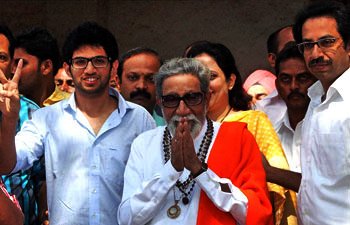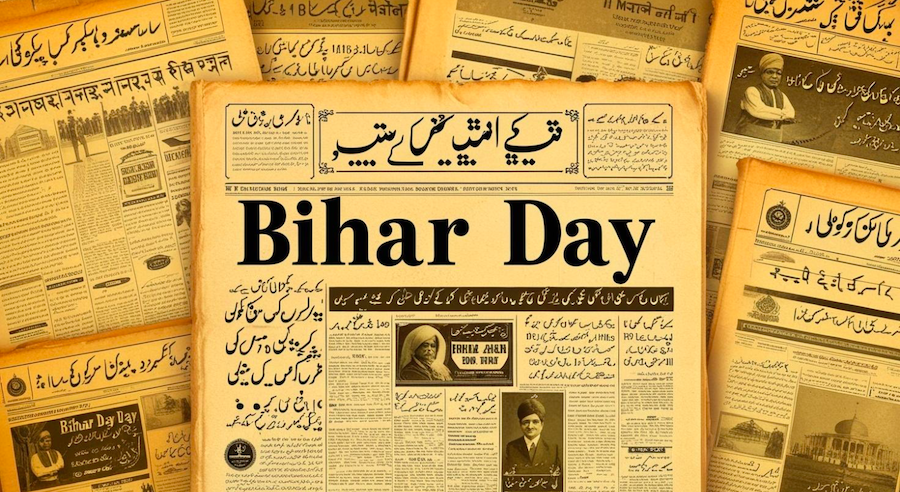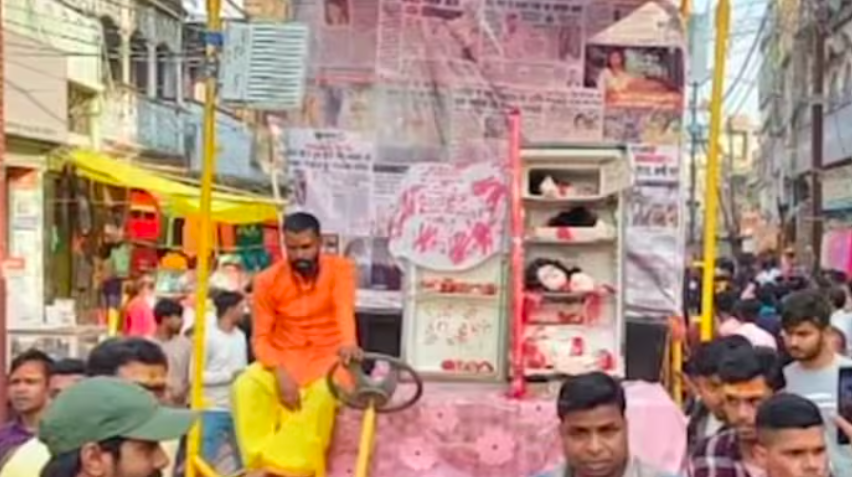Krishnaraj Rao
Hindsight is not always perfect. Citizen candidates who failed to get voted as corporators are today in a state of sadness, anger and disillusionment. In this mood, they are doing a post-mortem of the last 2-3 months. There is a human tendency to pin the blame on the people nearest to them, especially those who tempted them to become citizen candidates. Let us look at what might be going on in the minds of the citizen candidates.

OUR FAVOURITE WHIPPING BOYS WILL BE:
*Mumbai 227 — The citizen platform that inspired a majority of citizen candidates to stand, and generated the maximum amount of energy, will now be unsparingly criticized. Everything from its vision, its selection methods and its sense of timing will be subjected to great criticism. Motives will be imputed to several leading individuals. There will be lots of I-told-you-so discussions.
*Loksatta Party — because people expected more from a citizen party that is many years old, as opposed to a citizen platform cobbled-together by well-meaning individuals on the eve of elections.
*Adolf D’Souza, the ‘first ever’ citizen candidate elected in 2007 — for not mentoring citizens to step into his shoes – especially Juhu residents who had campaigned door-to-door for him in 2007. Why didn’t he pass on his knowhow and experience, people will ask.
*Stalwarts like Praful Vora and Mayank Gandhi who organized the campaign to get Adolf elected will catch flak for diverting all their energies to Arvind Kejriwal’s India Against Corruption (IAC) in 2011. The likely questions are: Why didn’t the IAC itself become a citizen platform? Why didn’t it field candidates? If it had, the energy of the anti-corruption movement would have transferred to election campaigning, and those citizen candidates might have won!
*Anna Hazare & Arvind Kejriwal– Why did they not give back to Mumbai some of the energies that Mumbai gave to them? Why did they not play the role of star campaigners in the election?
*The citizen candidates themselves – Were the people chosen by citizen platforms of the right quality? Were they sufficiently inspiring and resourceful as individuals? Were they true leaders? Or were they just ambitious men and women who wanted a free ride on the prevailing anti-corruption sentiments? Should Mumbai 227 have chosen fewer candidates and put all their energy behind them?
*The timing – Did the mobilization of citizen candidates start out too late to be effective? Should the runup to the elections have started when Anna Hazare was fasting in Ramlila Maidan? Or even earlier, say in Feb-March 2011, when crowds started gathering in Azad Maidan around the Jan Lokpal Bill issue?
*Media – Did it adequately support the citizen candidates, collectively and individually? Or did media let down the citizen candidates when paid articles and soundbites from political parties started flowing in? Did some negative articles in prominent papers like Times of India and Mumbai Mirror hurt the prospects of some candidates?
*Friends & Fellow Activists – Did they adequately support? Should activists have dropped whatever they were doing and rushed to the support of their friends and colleagues? After all, when having even one activist inside the BMC can empower everybody, was it not morally binding on every activist to devote all their energy to the campaign?
*Lack of Pre-poll Alliances – Why did Loksatta, Mumbai 227 and other platforms pit their candidates against one another in some constituencies? Could they not have avoided splitting the support base by withdrawing their candidates in some wards?
I feel that most of the above is just a blame-game. These are either imaginary or secondary causes. Let us put these behind us.
The PRIMARY CAUSES are in the places that we middle-class activists and intellectuals hate to look. Let us take a step back and see where and how Shiv Sena, Congress, BJP, MNS and other mainline political party candidates won. Understanding how the public really votes is the first step to success.
HOW THE AAM AADMI VOTES:
1) VOTING DEPENDS ON INSPIRING EMOTIONS & PRIDE, NOT REASONING. We activists and citizen candidates try to get our votes by appealing to reason. But as a group, people are emotional. Emotions translate into action, reasoning only translates into thoughts and discussions. The Thackeray family’s success and durability in politics is because they are appealing to the emotional part of your mind. Their speeches, writings and actions evoke pride and righteous anger in their target audience. They use shock-and-awe tactics. Bal Thackeray and Raj Thackeray are like Amitabh Bachchan of the 1980s and 2012; Raj Thackeray is the angry young man, Bal Thackeray is forceful old man with a lot of experience and firepower left in him. Look at the Shiv Sena tiger symbol, bow-and-arrow, flag, fortress-shaped meeting places etc. Look at the titles the Thackerays give themselves, such as Hindu Hriday Samraat and Saaheb. All of them symbolizes Maharashtrian and Hindu pride. It is easy for underprivileged people to identify with them and be inspired by them.
2) UNDERPRIVILEGED PEOPLE VOTE MAXIMUM. Whether you like it or not, the reality is that in Mumbai, the maximum votes are polled by those who feel that they are underprivileged. A very large chunk of the votes polled are shared between Shiv Sena, BJP, MNS, RPI and SP. Congress and NCP win only in places where they can provoke the minorities to come out and vote i.e. Muslims and Christians who feel exploited, underprivileged and afraid of the majority.
3) BRAND RECALL DETERMINES VOTES. People automatically vote for the brand, such as hand or lotus. Brand loyalty is very difficult to break, because it is not at the intellectual level, it is at the irrational or visceral level. For example, I feel very comfortable voting for the hand symbol even though I criticize the Congress party. It is an old habit, and very difficult to break, because I have associated some qualities (such as the freedom struggle and secularism) with this symbol that go beyond the individual qualities of the leaders or the candidates. Even if you totally convince 100 Congress voters that you are a better candidate, 80 will still put their vote on the hand, because voting for any other symbol else requires a great effort, and raises great doubts in the mind. Voting for a known brand gives comfort to the voter. As an independent candidate, you are assigned a new symbol, and that has zero brand value i.e. the symbol is not associated with any qualities in the voter’s mind.
4) 90% OF THE VOTERS REPEAT THEIR PREVIOUS ELECTION PREFERENCE. Almost everybody you know will be consistent in his choice of party. That is why each constituency has its own characteristic e.g. Shiv Sena bastion, Congress bastion etc.
5) REMAINING 10% SWING VOTES DETERMINE THE OUTCOME. The differences in poll outcomes arise from the small minority of people who keep changing their mind every election. These are the people who are swayed by the election campaigning, press reports, sentiments etc. These are the ones who feel angry with the ruling alliance and vote against it (anti-incumbancy sentiment), or feel happy with its performance and vote for it. Differences in outcomes are generally decided by as few as 2% of the voters.
6) MOST WINNING CANDIDATES BELONG TO THE SLUMS. It is very easy for Mangesh Pawar or Sonal Mhatre living in the Devipada slums or BDD chawl to ask all their friends and neighbours to come out and vote for them. Such people share a deep connect in the neighbourhood, as they dance together at weddings and Ganapati festivals. Their faces are featured repeatedly in the flex banners that are put up for festivals, Bal Thackeray’s birthday celebrations etc.
7) FLAT DWELLERS RARELY VOTE. Even if a person living in a flat feels that you are a good candidate, you cannot count on him to come and vote for you. The reasons are (a) apathy about what happens to the country, state and city (b) lack of faith in democratic processes and systems (c) too much faith in his ability to buy his way out of difficulties with money-power and social contacts.
CITIZEN CANDIDATE IS NOT AAM AADMI…
CITIZEN CANDIDATE HAS NO CONNECT WITH EVEN HIS OWN NEIGHBOURS. Citizen candidates are mostly intellectuals and activists like us, living in flats. Being individualistic, we don’t act as a community; and so we find it difficult to exert moral pressure on our friends and neighbours to come out and vote as a cohesive community. Every day of our lives, we live as individuals even within our families. The up-side of being extremely focused as individuals is that we make rapid progress in our chosen professions and businesses. The down-side is that we are unable to act cohesively as a group or community.
CITIZEN CANDIDATE HAS NO CONNECT WITH THE SLUMS. Let’s face it, slum people don’t need our votes. We — citizen candidates — need the votes of the slum people to win any elections, but we have great inhibitions in walking onto to the slums and sitting down. We don’t like to drink the same water that they do, we don’t like the look and smell of their plates and glasses. Even if we speak fluent Marathi, we don’t speak the same language. We generally don’t know what it is like to buy grain from ration shops, stand in queues every morning to get water from the community taps, use the community toilet blocks, and live with the doors open all day so that neighbours’ children come and go freely.
WE DON’T CARE FOR CIVIC ISSUES OF SLUM-DWELLERS. Very few of us actually work for getting rights for slum-dwellers such as water connections, clean toilets, etc. We don’t like to sit with them and discuss civic issues from their perspective. We don’t try to remedy the lacunae of the municipal schools and mid-day meals provided to children. They are not even number 10 on our list of priorities.
IN FACT, SLUM DWELLERS & HAWKERS ARE ‘THE ENEMY’. In our eyes, slum-dwellers are the people who make Mumbai less-than-perfect. Many of us flat-dwellers hate the slums and despise the people living in slums (except for our domestic servants, watchmen, newspaper vendor etc, whom we categorize differently). As activists, we campaign for slums to be demolished, and for hawkers to be removed from the pavements. While we want the cheap services that they render in our homes and offices, we want them to turn invisible somehow. In our minds, a citizen candidate is a middle-class activist who will help us in eradicating slums, demolishing hawker stalls and making Mumbai look like Shanghai. So how can we convincingly say anything to these people?
IF WE WISH TO MAKE A SERIOUS BID FOR 2014 LOK SABHA OR VIDHAN SABHA ELECTIONS…
We will have to RETHINK OUR WHOLE PHILOSOPHY. We will have to reorient ourselves emotionally and intellectually in favour of the poor. We will have to learn to think, talk and walk as Medha Patkar’s NAPM activists do. We will have to see civic issues from the perspective of 65% of Mumbai’s population, which lives in the slums and in tiny Lower Income Group housing, buys filthy rice and wheat from ration shops, buys water from illegal tanker-wallahs by the gallon to fulfill its needs, and is forced to use unimaginably dirty toilets.
We will have to IDENTIFY WITH THE AAM AADMI. We will have to walk a few miles in the rubber chappals of the common man, sleep in his stuffy ill-ventilated house. We will have to lose our love for air-conditioned lifestyle and internet discussions.
We will have to LAUNCH A POLITICAL PARTY that represents the interests of both the slum-dweller and the flat-dweller, and try to somehow reconcile these opposing worldviews and interests. We will have to appeal to everybody’s emotions, and not just intellect. We will have to BUILD A BRAND with the emotional appeal of Shiv Sena’s roaring tiger, BJP’s lotus and Congress’ hand.
WALK THE TALK. We will have to be with slum-dwellers and others for at least 3-4 hours per day. We will have to build our own leadership style and personal charisma with the people we wish to make our own. We will have to EMBODY THE VALUE SYSTEM that we are offering them.
Otherwise, forget it. Let us stop confusing ourselves about who we are and what we want. Let us stay in our space as RTI activists, and do what we do best – RTIs, letter-baazi etc. It is not bad. In fact, it really is quite good. There is no doubt that we are delivering value to society in our own way. We are working for good governance from an intellectual and middle-class perspective, and that is also a necessary service to society. So why struggle to become something that we are not?
(Krishnaraj Rao is a prominent Right-to-Information activist and journalist based in Mumbai. He can be reached at thebravepedestrian@gmail.com )
The views expressed in this article are the author’s own and do not necessarily reflect BH’s editorial policy.








